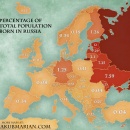 |
‘In the future’ vs. ‘in future’ in British and American English
“Future” can be either an adjective or a noun. When used as an adjective, it doesn’t take any article itself; it is preceded by the (...)
August 6, 2015 – Jakub Marian – English
|
 |
Russian immigration in Europe (map)
The following map shows the percentages of residents of European countries who were born in Russia (i.e. first-generation immigrants of (...)
July 29, 2015 – Jakub Marian – Maps
|
 |
‘So to say’ vs. ‘so to speak’ in English
Both “so to speak” and “so to say” (meaning “as one might say”) can be found in English literature and English dictionaries. However, take (...)
July 25, 2015 – Jakub Marian – English
|
 |
Comma after ‘i.e.’ and ‘e.g.’
The abbreviations i.e. (which means “that is” or “in other words”, from Latin id est) and e.g. (which means “for example”, from Latin (...)
July 19, 2015 – Jakub Marian – English
|
 |
‘Compare to’ vs. ‘compare with’ in English
Some authors claim that “compare to” and “compare with” mean essentially the same, but this is not supported by actual data. The verb (...)
July 12, 2015 – Jakub Marian – English
|
By the way, have you already seen my brand new web app for non-native speakers of English? It's based on reading texts and learning by having all meanings, pronunciations, grammar forms etc. easily accessible. It looks like this:
 |
Difference between ‘stay’ and ‘stand’
To stay means “not to change location or value; to remain”. To stand means “to be in a vertical position (on one’s feet, in case you (...)
July 9, 2015 – Jakub Marian – English
|
 |
Difference between ‘engine’ and ‘motor’
Both engine and motor refer to a device used to convert some form of energy into mechanical motion. They are sometimes used (...)
July 4, 2015 – Jakub Marian – English
|
 |
German suffix -anz: feminine nouns
To say that all German nouns ending with “anz” are feminine would be inaccurate, but there is a grain of truth in that. All German nouns (...)
July 2, 2015 – Jakub Marian – German
|
 |
Present perfect with a specific time in the past
The present perfect expresses the idea of “an action that was finished at some unspecified point in the past”. Saying “I have done (...)
July 1, 2015 – Jakub Marian – English
|
 |
‘On time’ vs. ‘in time’ – the difference
The difference between “on time” and “in time” is a subtle one, and the two expressions may sometimes be used interchangeably. (...)
June 30, 2015 – Jakub Marian – English
|
